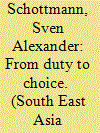| Srl | Item |
| 1 |
ID:
130575


|
|
|
|
|
| Publication |
2014.
|
| Summary/Abstract |
A content analysis of print advertisements and customer websites of Islamic banks in Malaysia, this paper examines the changing marketing and branding landscape of Islamic banking products and financial services. When Islamic banks were first set up in Malaysia in the early 1980s, their advertising material emphasized the religious obligations of Muslims to save and invest with shari'a-compliant financial products and services. Amid the ongoing liberalization of Malaysia's Islamic banking sector since the mid-1990s, a transformation of this marketing strategy appears to have taken place. Islamic banks no longer emphasize a priori the religious imperatives or even the ethical principles that underlie their business model. Rather, they tend to stress that banking according to the principles of the shari'a is an economically rational alternative to the conventional system. Islamic banks in Malaysia portray themselves not simply as Islamic banks, but as better, more profitable and safer alternatives to the crisis-prone conventional, interest-based banking sector. This paper examines this transformation, and seeks to relate the three broad trends it has identified in the advertisement of Islamic banking services to the wider socio-cultural, economic and political changes that have been under way in Malaysia since the late 1960s.
|
|
|
|
|
|
|
|
|
|
|
|
|
|
|
|
| 2 |
ID:
172452


|
|
|
|
|
| Summary/Abstract |
This article examines the creation of the first privately-owned Muslim banks in the first half of the twentieth century and the legal debates they instigated among Muslim communities. Whether in Bosnia or India, these banks appeared suddenly in the years immediately before the First World War. They were envisioned as a way to free up Muslim capital for productive ends, and as the means to jumpstart a Muslim economic renaissance. Far from masking their interest transactions, the banks' founders and customers pointed to a range of Islamic legal rulings that justified interest levied on deposits and loans. These rulings varied from one geographic locale to the next, and were expressive of diverse Muslim institutional and legal histories. Yet in an age when the formerly diffuse discursive terrain around interest, usury, and the Islamic foundational sources was shifting towards a consensus that rejected any interest/usury distinction, some of these banks faced acute challenges, particularly in India. There, novel notions of interest-free Islamic economics were articulated from the interwar period, which rejected any form of Muslim interest-banking. In time, the earlier iteration of Muslim interest banking became overshadowed by the new paradigm of “Islamic banks” which purportedly eschewed all financial interest.
|
|
|
|
|
|
|
|
|
|
|
|
|
|
|
|